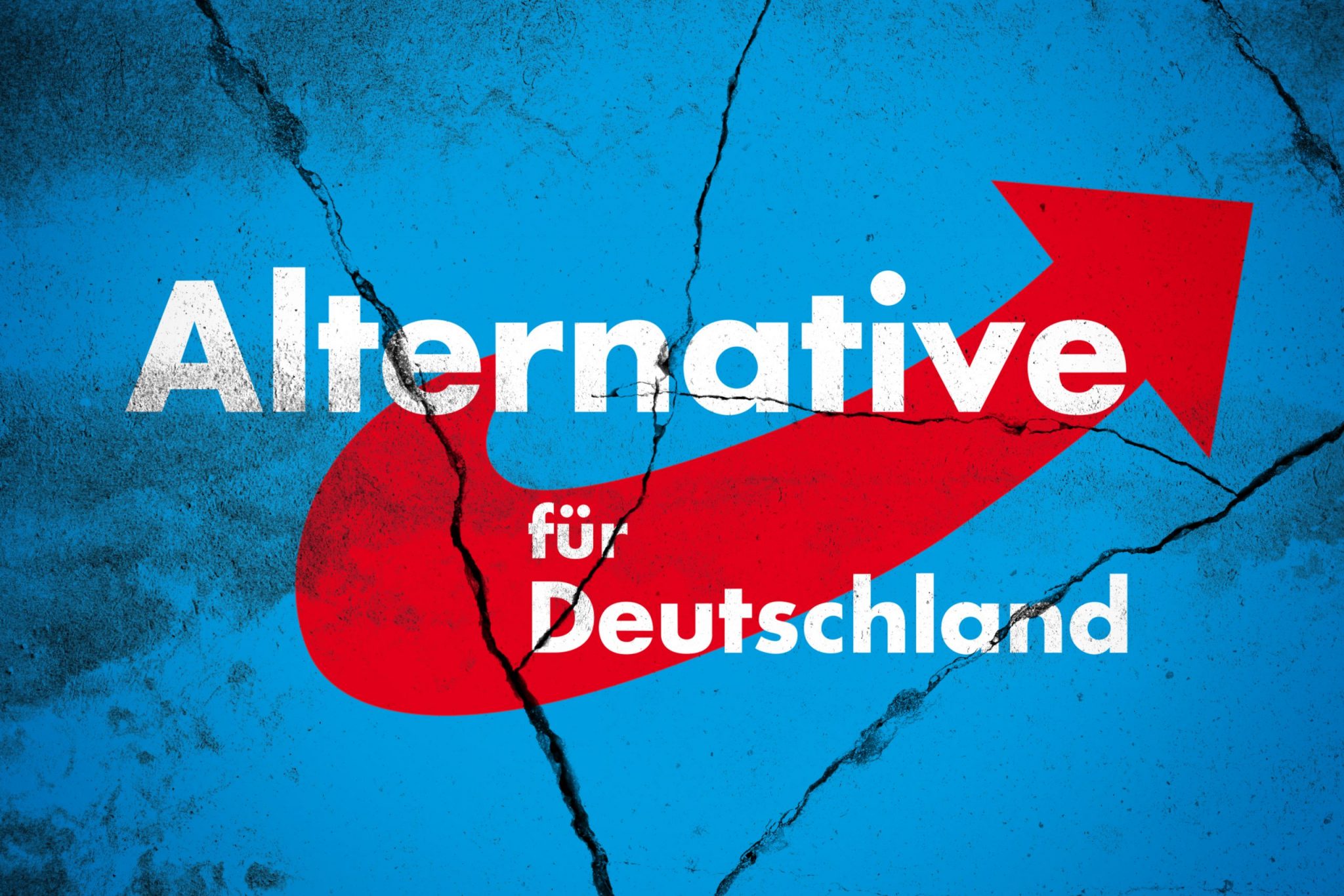The alignment of interests between the German right-wing party, Alternative for Deutschland (AfD), and Russia’s flagship German-language media outlet, RT Deutsch, is both well-documented and unsurprising, given the Kremlin’s penchant for supporting divisive, radical, or fringe political movements in the West. However, analysis of data collected by ASD’s German 2021 Election Dashboard found that in the months leading up to the election RT Deutsch did not disproportionately cover the AfD compared to traditional German media outlets (though an accurate count of mentions proved difficult due to false positives and the use of full party names versus abbreviations). Additionally, while RT Deutsch’s coverage of the AfD was more positive than that provided by German domestic media outlets, overt support for the AfD and its political leaders was rare. At the same time, RT Deutsch’s editorialized coverage of controversial topics ranging from vaccine mandates to refugee policies showed significant congruence with the political and social positions promoted by the AfD. This de facto support for the AfD’s political platform, if not the party itself, helped boost RT Deutsch’s popularity among AfD supporters, as evidenced by the fact that public AfD affinity groups and pages on Facebook were more likely to share RT Deutsch content than groups and pages associated with every other German political party combined.
RT Deutsch Amplification on Facebook
To understand the groups and pages most responsible for sharing RT Deutsch content on Facebook, we analyzed all RT Deutsch videos with more than 400 likes and all RT Deutsch articles with more than 4,000 likes on Facebook between March 15 and September 23, 2021. Apart from groups and pages opposed to vaccines and other coronavirus public health measures, groups affiliating themselves with the AfD were among the most active amplifiers of RT Deutsch content. (Note: Groups and pages were categorized based solely on the name of the group or page. Analysis of content shared within pro-AfD and anti-vaccination groups revealed significant cross-pollination between groups and pages opposed to coronavirus public health measures and those supporting the AfD). The network of AfD affinity groups included supporters of the AfD, such as “Freunde der AfD!” (Friends of the AfD), “AfD 51% – das ist unser Ziel !!!” (AfD at 51% – that is our goal), and “AfD jetzt erst recht !” (AfD more than ever); groups linked to regional AfD organizations, such as “AfD – Kreisverband Weserbergland,” “AfD – Kreisverband Märkisch-Oderland,” and “AfD Wolfsburg;” as well as groups linked to AfD politicians, such as “Birger Gröning, AfD MdL,” “Gunnar Lindemann MdA,” and “Tino Chrupalla.” Of the 1,146 groups or pages that shared at least one piece of RT Deutsch content during the studied period, 139 had names suggesting an affiliation with or affinity for the AfD. By comparison, there were only 12 groups that referenced support for Die Linke or the political Left, three groups that referenced the Greens (all were opposition groups), two that mentioned the SPD, and none referenced the CDU/CSU (though there were several groups opposed to Angela Merkel).
Narrative Alignment
Both RT Deutsch and AfD affiliated accounts monitored on the dashboard covered the coronavirus vaccine and pandemic-related measures in a predominantly negative way. RT Deutsch was the most influential account with regards to the key phrase “Impfpflicht” (vaccine mandate). It used the phrase roughly the same number of times as all other domestic German media accounts monitored on the dashboard combined.

Key phrase “Impfpflicht” mentioned from March 1, 2021 to October 28, 2021 by Russian accounts and German Media accounts. Dark blue represents RT Deutsch; gray represents German media outlets.
In terms of the major political parties, Twitter accounts affiliated with the AfD used the term “Impfpflicht” more than any other party (the FDP was a close second). The two most active accounts to tweet about the subject were the AfD’s Bundestag account and the personal account of AfD party leader Alice Weidel.

Key phrase “Impfpflicht” mentioned from March 1, 2021 to October 28, 2021 by German party accounts. The AfD is represented in blue on the chart.
Moreover, a closer look at the related key phrase “Impfung” (vaccine) reveals predominantly negative coverage of the topic by RT Deutsch and AfD accounts. Whereas other German parties mainly focused on advances in the vaccination campaign in Germany, both RT Deutsch and AfD portrayed vaccines as negative or even dangerous, alleging dire side effects and lamenting limitations to unvaccinated people’s lives as a result of vaccine mandates.

Most retweeted Tweets by RT Deutsch for key phrase “Impfung” from March 1, 2021 to October 28, 2021.
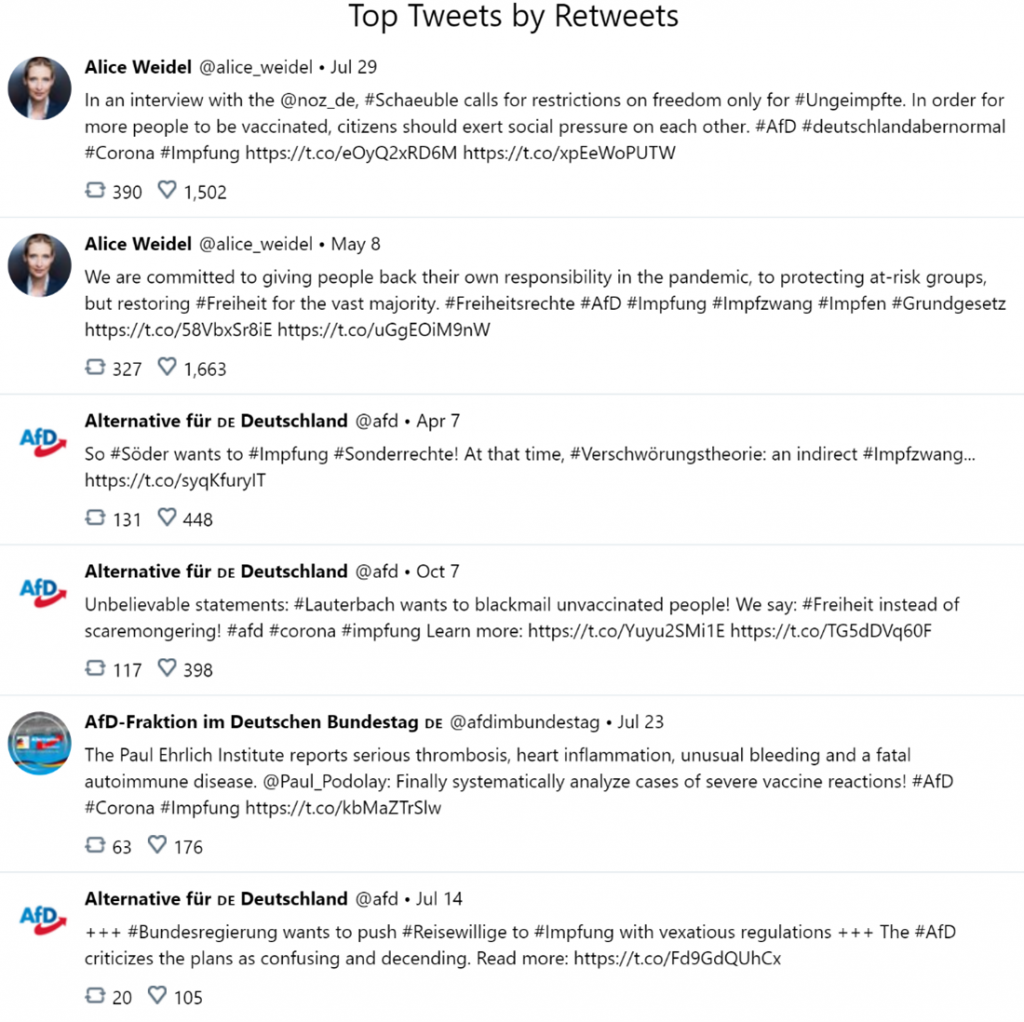
Most retweeted Tweets by AfD accounts for the key phrase “Impfung,” from March 1, 2021 to October 28, 2021.
RT Deutsch and AfD accounts were also aligned on the question of migration and refugees. The AfD, which started as anti-EU party but has increasingly become an anti-immigration party, has often promoted content hostile to Germany’s liberal migration policies. Despite a focus on Covid-related policies in the 2021 campaign, migration remained one of the party’s core issues. At the same time, the dashboard demonstrated the importance of the topic for RT Deutsch. Out of all Russian and German accounts included on the dashboard, RT Deutsch used the hashtag “#Flüchtling” (refugee) more than any other account, and only Bild, AfD’s main account, and Alice Weidel generated more engagement in tweets that used the hashtag.
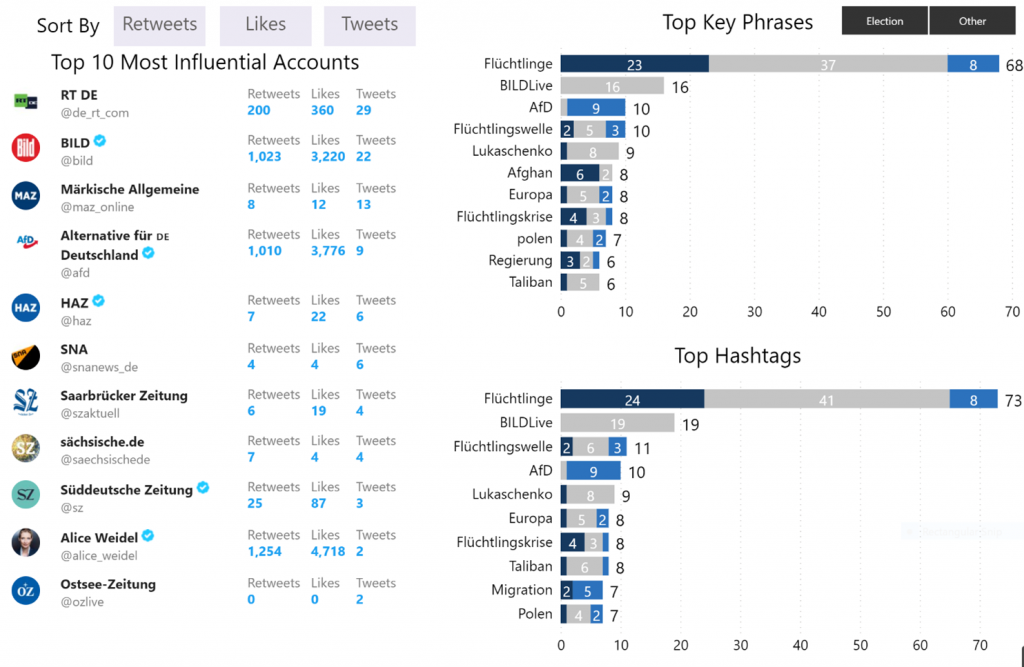
Accounts mentioning the hashtag refugee (Flüchtling) from March 1, 2021 to October 28, 2021.
The most successful tweets by RT Deutsch and AfD affiliated accounts on the dashboard warned about a new influx of migrants and refugees and used fear-mongering language such as “Flüchtlingswelle” (wave of refugees).
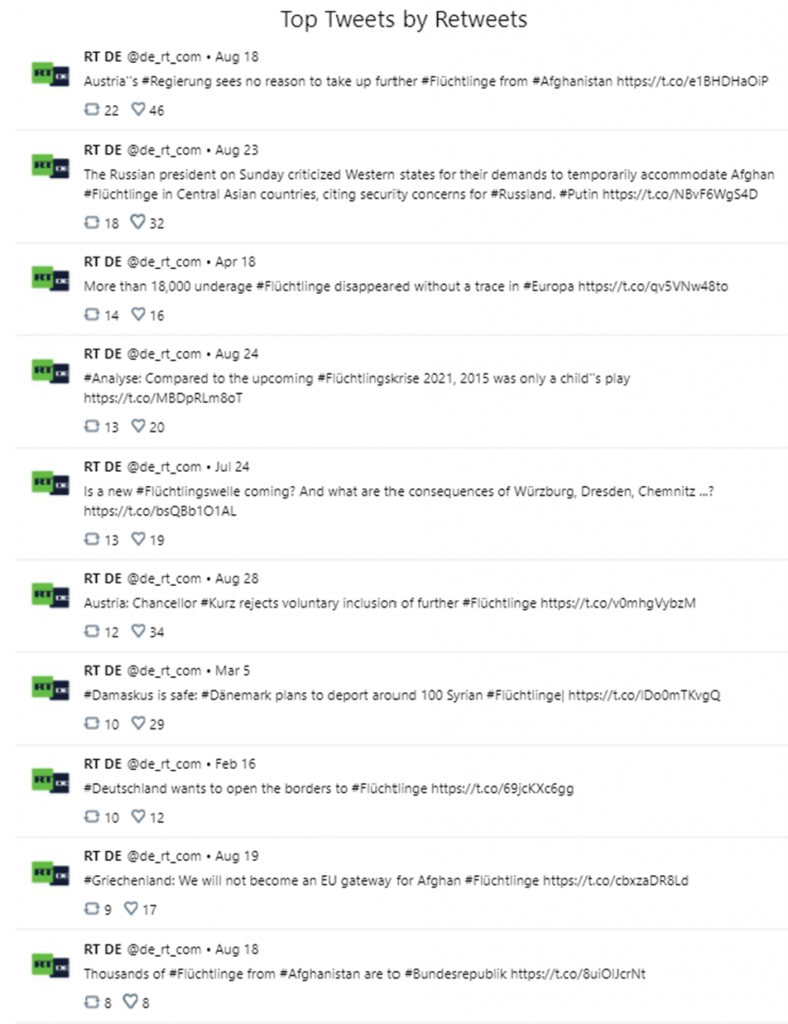
Most retweeted tweets by RT Deutsch with key phrase “Flüchtling” from January 1, 2021 to October 6, 2021.
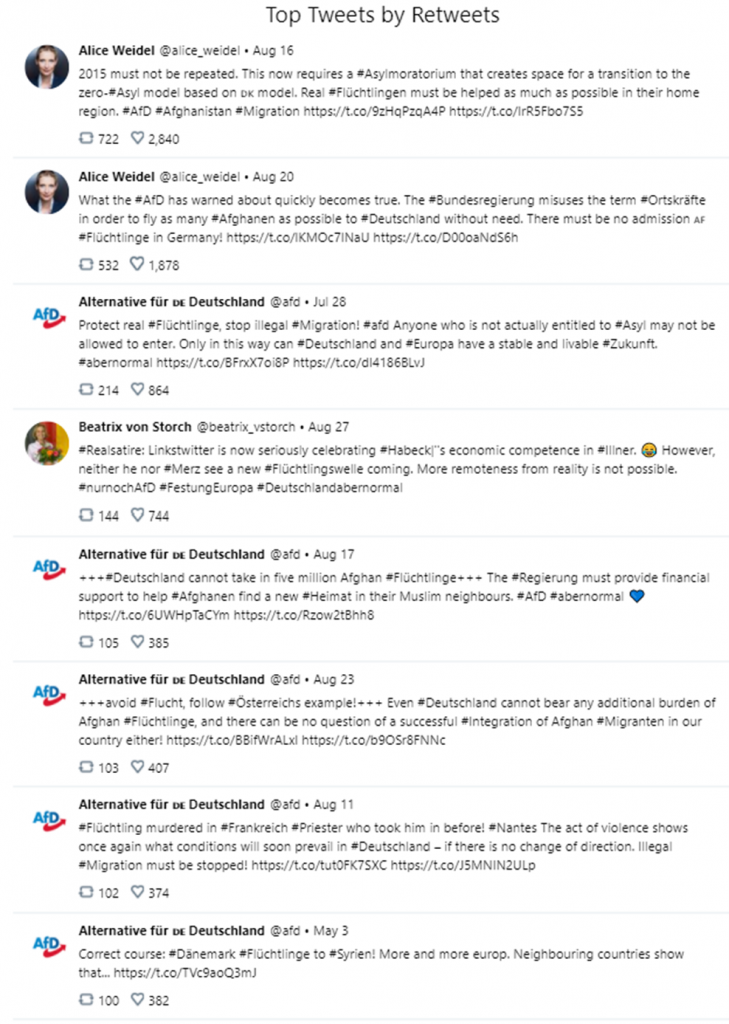
Most retweeted tweets by AfD accounts with key phrase “Flüchtling” from March 1, 2021 to October 6, 2021.
Conclusion
RT Deutsch’s success with supporters of the AfD speaks to Russian state media’s ability to appeal to viewers in much the same way that far right and far left political parties appeal to voters—namely, by concentrating on domestic wedge issues that targeted groups feel are neglected or manipulated by the “mainstream” media or political elites. RT and its affiliates accomplish this not by directly supporting candidates or their positions, but by producing editorialized content that reinforces certain audiences’ already held political or social beliefs, as was the case with RT Deutsch’s amplification of coronavirus and refugee narratives that were promoted by the AfD. This alignment of interests allows RT to gain a foothold within certain communities, giving them an audience for Kremlin-friendly opinions on a range of subjects—some of which are far more consequential to Russian state interests, like Nord Stream 2. The concern, therefore, is not so much about RT Deutsch’s ability to shape domestic debates in Germany, as it is about their ability to use domestic debates to shape Germans’ thinking on a range of geopolitical issues.
The views expressed in GMF publications and commentary are the views of the author alone.

